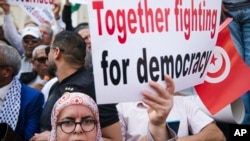As Tunisia prepares to vote on a new constitution, here is some background on the North African country of 12 million people and torchbearer of pro-democracy uprisings that rocked the region in 2011.
Independence to Revolt
Tunisia gained independence from France in March 1956. A year later, it was declared a republic with secularist Habib Bourguiba as its president.
In 1987, Bourguiba was deposed by prime minister Zine El Abidine Ben Ali in a bloodless coup after doctors declared the aging president mentally unfit.
Ben Ali developed the economy, but turned Tunisia into a police state and allowed his clan to build fabulous wealth through corruption and monopolies.
He was elected and re-elected in multiple votes, often rigged, before being toppled by popular protests in 2011 after 23 years in power.
Arab Spring
In December 2010, a young fruit seller set himself on fire in the central town of Sidi Bouzid to protest police harassment and unemployment, giving birth to Tunisia's revolution.
The desperate act of university graduate Mohamed Bouazizi, who died days later, triggered weeks of mass protests against unemployment, high living costs, nepotism and state repression.
Ben Ali later said he would not seek re-election, but the announcement failed to appease the huge crowds calling for him to leave. On January 14, 2011, he fled to Saudi Arabia.
Tunisia's revolution inspired other Arab nations to rise up and topple autocratic leaders, including Egypt and Libya. But most of the revolts ended in civil war or military-led counter-revolutions.
Secularists vs Islamists
Tunisia's first free elections were held in October 2011 to choose an assembly to write a new constitution.
The polls were won by the Islamist-inspired Ennahdha movement.
Lawmakers adopted the new constitution in January 2014, after two years of political turmoil that exposed deep rifts between Ennahdha and the secular opposition.
In October 2014, the secular Nidaa Tounes party won a parliamentary election. Two months later, its elderly leader Beji Caid Essebsi won the country's first free presidential election.
In 2019, Ennahdha again became the biggest bloc in the deeply fragmented parliament, holding a quarter of the seats.
Retired university professor Kais Saied was elected president on an anti-establishment platform.
Economy
Tunisia, which has been in economic crisis since the revolution, is in talks with the International Monetary Fund about a bailout package to save it from bankruptcy.
The country was plunged into yet another political crisis after President Saied sacked the government and suspended parliament in July 2021, accusing them of incompetence.
His power grab proved popular with Tunisians disillusioned with the political class, but has fueled fears of a return to autocratic rule.
Women's rights
Since independence, Tunisia has been regarded as relatively progressive on women's rights in the Arab and Muslim world, adopting laws in 1956 that abolished polygamy and allows either spouse to request a divorce.
The 2014 constitution set a goal of parity in elected assemblies. In 2017, parliament adopted a law to tackle violence against women.
Jihadist scourge
Tunisia was both a prime target of attacks by the Islamic State group and one of the top sources of foreign jihadists traveling to Syria and Iraq to fight alongside the Sunni extremists.
IS claimed three major attacks in Tunisia in 2015 that killed 72 people, mainly foreign tourists and members of the security forces.
In 2016, 13 security personnel, seven civilians and at least 55 jihadists were killed in a battle in the town of Ben Guerdane, near the border with Libya.
Authorities say they have made significant progress in the fight against terrorism since then, but the country is still under a state of emergency imposed in 2015.
Cultural heritage
Tunisia is home to many sites on UNESCO's World Heritage list, including the Old Cities of Tunis and Sousse and the archaeological site of Carthage, capital of a Phoenician civilization that rivaled ancient Rome.
The Muslim holy city of Kairouan and nearby El Jem, whose Roman colosseum ranks among the finest in the world, are also listed.










